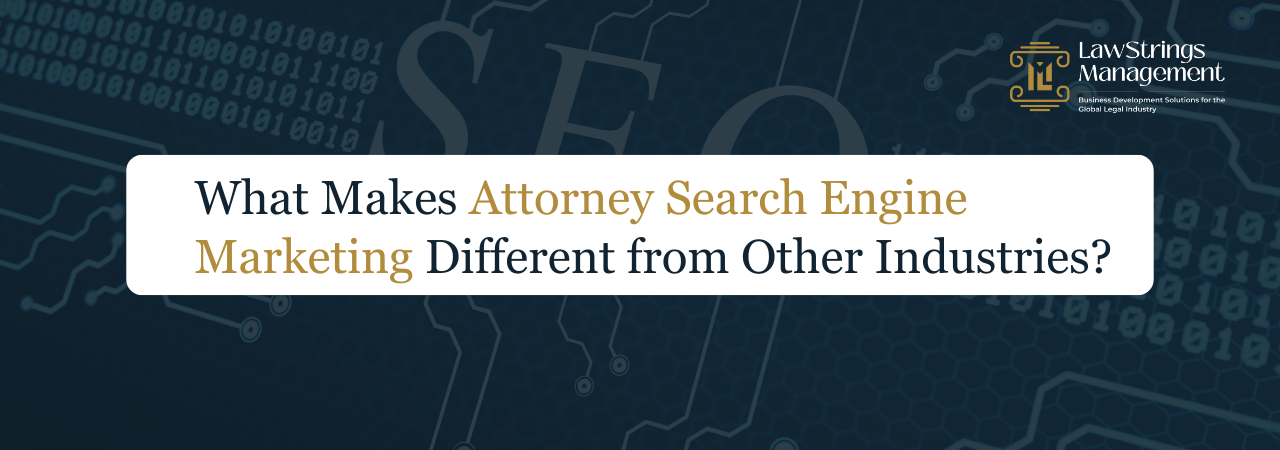The best marketing strategies benefit any business, regardless of its sector. In today’s digital age, no business can afford to ignore marketing efforts. However, attorney search engine marketing differs significantly from other industries. The landscape presents unique challenges and requirements that attorneys must navigate.
Grasping the Essentials of Attorney Search Engine Marketing
Attorney search engine marketing is the process of promoting legal services using various online channels, especially search engines. This means that a law firm’s website needs to be optimized for search engines or greater visibility. The legal sector is strictly regulated and has ethics that directly affect marketing in contrast to most other industries.
Key Differences in Attorney Search Engine Marketing
a) Ethical Considerations
Among the strongest differences that define attorney SEO marketing is ethical considerations based on legal marketing. Every state has bar associations providing strict guidelines to which attorneys should adhere in representing their legal services and what they could share with others. If an attorney were to state misleading claims or to market one’s self very aggressively then that would warrant some level of disciplinary action.
This regulatory environment requires a more sensitive application of digital marketing. Lawyers should ensure that their marketing materials are not only effective but also compliant with such guidelines. This is quite rare in other industries since firms have more flexibility in their marketing strategies.
b) Highly Competitive Market
Legal is an extremely saturated industry where many firms are competing for the same clients. Such saturation makes attorney search engine marketing more difficult. A firm has to stand out from the other firms in the same geographic location and practice area. This requires a good understanding of the local market, focus on specific keywords, and content that speaks to a potential client.
While in other sectors there is competition, the rivalry intensity in the legal field, particularly in the more demanded areas, such as personal injury or family law, is a battle to gain visibility on search engines and requires targeted strategies.
c) Importance of Local SEO
Local is where most lawyers would deal with. This entails a lot of local SEO work in the attorney SEM. Local SEO is a firm optimizing its online presence for obtaining more business from a specified geographical location. Such an SEO involves claiming and optimizing all Google My Business listings pertaining to your law firm. Asking for local reviews besides NAP – Name, Address, and Phone being the same in directories can form part of this exercise.
Other businesses may not depend so much on local SEO, especially if they cater to a wider or even worldwide market. For law firms, however, showing up in local search results can be the difference between gaining a new client or losing them to a competitor.
d) Content Marketing Strategies
Content is an important factor in attorney search engine marketing. Law firms must create quality content that reflects their expertise and answers all the questions a potential client may have. This content can include blog posts, articles, FAQs, and case studies about various legal issues.
While content marketing remains really crucial for many business fields, it is a bit more demanding for the legal service. Attorneys in such professions have to be more stringent with their excellence and accuracy. Their content must look attractive but should be factually accurate and align with legal rules. Such a fact, among others that is more stringent in case of legal marketing puts it at a different altitude.
e) Conversion rate optimization
This would be conversion rate optimization- the most important aspect in attorney search engine marketing. A law firm website should always convert its visitors to becoming clients. This is because apart from having a friendly design, the website must indicate clearly all calls to action, should have easy-to-access contact information, and have contents that can incite a visitor to make that call.
While CRO is useful in all industries, the stakes are higher for law firms. One client is a significant investment, and every conversion is critical, so attorneys must continually review and refine their marketing strategies to improve conversion rates.
f) Reputation Management
Reputation is everything in the profession of law. Online reputation, for example, hugely plays a role in attracting clients for a successful firm. Attorney search engine marketing involves managing reviews and the response to client feedback plus any negative comments that are likely to appear online.
This emphasis on reputation management is a bit more unique to the legal profession. Other industries are also concerned with their reputation, but personal nature of legal services makes it all the more important. Many clients seek lawyers based on recommendations and reviews on the internet; thus, online reputation for attorneys is the most crucial thing.
The application of SEO Tools and Analytics
Attorney search engine marketing relies a lot on advanced SEO tools and analytics. This information can help a law firm track its performance, what users are doing, and where it can improve to better its position. Making marketing decisions based on actual data increases the efficiency of attorneys’ efforts.
Many businesses use analytics to monitor marketing success, but with the legal field, insight can directly impact a firm’s ability to attract and retain clients. Also, this opportunity presents law firms with the ability to continually refine their strategies on changes within the market as well as consumer behavior.
Conclusion:
Attorney search engine marketing is a niche practice. It requires specialized knowledge of the legal landscape. Ethical considerations play a crucial role in this field. Additionally, the competitive nature of legal services adds complexity. Focusing on local SEO is essential. Reputation management is also critical for success. Content marketing helps attorneys engage potential clients. Lastly, conversion optimization is vital for turning visitors into clients. Together, these strategies enable attorneys to navigate the complexities of digital marketing effectively.



